
General Sir Redvers Buller
Redvers Henry Buller was to become a controversial figure but in 1895 he was at the height of his career as Adjutant General of the British Army. He had had a distinguished career, serving in most of the hot spots of the British Empire, and had earned the Victoria Cross at the Battle of Hlobane, in the Zulu War.
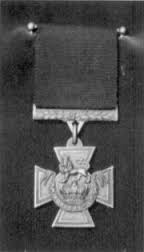
The Victoria Cross
He was regarded as a fighting soldier and an Africa specialist. He was also regarded as a good leader, although in fact he had never held an independent command.
When things started to get difficult in South Africa in 1899, he was summoned to the War Office and offered the post of Commander-in-Chief of the Imperial Forces in South Africa, in the case of war breaking out. He declined the post, pointing out that he would rather go as Second-in-Command. Nevertheless, when the Anglo-Boer War did break out, he was appointed as Commander-in-Chief, with immediate effect.

Buller leaving Britain for the Cape
His request for an additional 50 000 troops for his campaign was slashed to 10 000 and his departure for South Africa was delayed for a fortnight by red tape.
When he finally arrived in Cape Town he decided that as the Commander he should operate against the Boers in Natal. He had specifically ordered the local commander, General Penn-Symons, not to cross the Tugela River to meet the Boer advance. This order had been ignored; Penn-Symons was killed at Talana and his successor, General White, was bottled up under siege in Ladysmith.
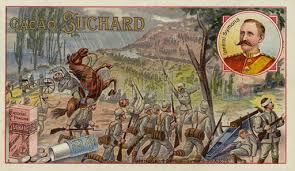
Gen. Penn-Symons
Other British forces were besieged at Mafeking and Kimberley, but Buller saw relieving Ladysmith as his first priority. He promptly moved on up to Durban, gathered together a force of 30 000 men and advanced up the rail line to Frere, where he established his headquarters.
His first major task was to get across the Tugela and he decided on a frontal attack at Colenso. The Boers, under General Louis Botha, were waiting for him and the assault ended in an ignominious defeat. Buller suffered heavy losses, amongst whom was Lt Freddie Roberts, the only son of Field Marshall Lord Roberts.
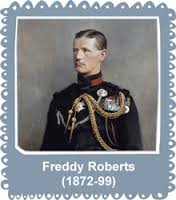
Freddie Roberts
Freddie was killed in a gallant, but vain, attempt to move a number of Buller’s guns which were in danger of being over-run by the Boers.
The defeat of Colenso was followed by the even more disastrous defeat at Spioen Kop. Buller was by now personally thoroughly demoralised and made the career-limiting mistake of telling Whitehall that he intended to tell General White to “fire off all his ammunition and surrender”. This thoroughly alarmed the British politicians and they promptly sent out Lord Roberts as new C-in-C, with Kitchener as his 2IC. Buller was relegated to OC of the Natal area and told to do nothing further and await instructions from Roberts. White ignored Buller’s suggestion that he surrender and Buller continued in his attempts (ultimately successful) to cross the Tugela and relieve Ladysmith.
At this stage, Ray Heron (in his lecture) broke away from Buller’s campaign and instead postulated the theory “what if Buller’s idea of surrendering Ladysmith had been accepted?”
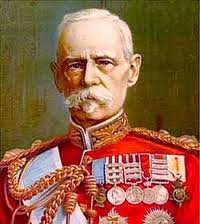
Lord Roberts
If Ladysmith surrendered, the Boers would have been able to call for negotiations, in which they would have held the whip hand, and it is possible the war could have been ended. This didn’t happen and instead the war dragged on, with its attendant concentration camps and guerrilla phase; the construction of about 8 000 block houses across the country and the subsequent desperate fight to the bitter end by the so-called Boer “bittereinders”. The legacy of hate and mistrust by the Afrikaners towards “the English” which arose from this lasted for generations and culminated with the Nationalist Party coming in to power in 1948. Ray then proffered the idea that it is just possible that if White had indeed surrendered much of what subsequently occurred might not have happened and South Africa’s history might have been irrevocably changed.
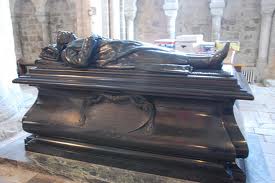
The Tomb of General Sir Redvers Buller
Returning to Buller, Ray added, during the ensuing question time, that Buller, although sidelined by the War Office, remained a highly respected general, especially by those who served under his command. He is one of the very few soldiers present at the unveiling of his own monument when, in 1905, a statue in his honour was unveiled in his home town of Exeter in Devon.
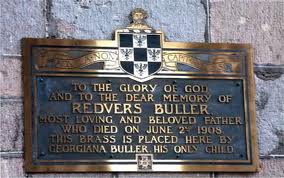
Memorial Plaque to Gen. Sir Redvers Buller
He died of natural causes in 1908.
Gleaned from a lecture by Raymond Heron, Battlefield Tour Guide, Kwazulu Natal.

Trips ZA Logo
For exciting History, Boer War, Wildlife, Scenic and other tours throughout the Panorama, Kruger, and Lowveld regions and beyond, call our Dream Merchants on
013 764 1177
Email us at johnt@tripsza.com
